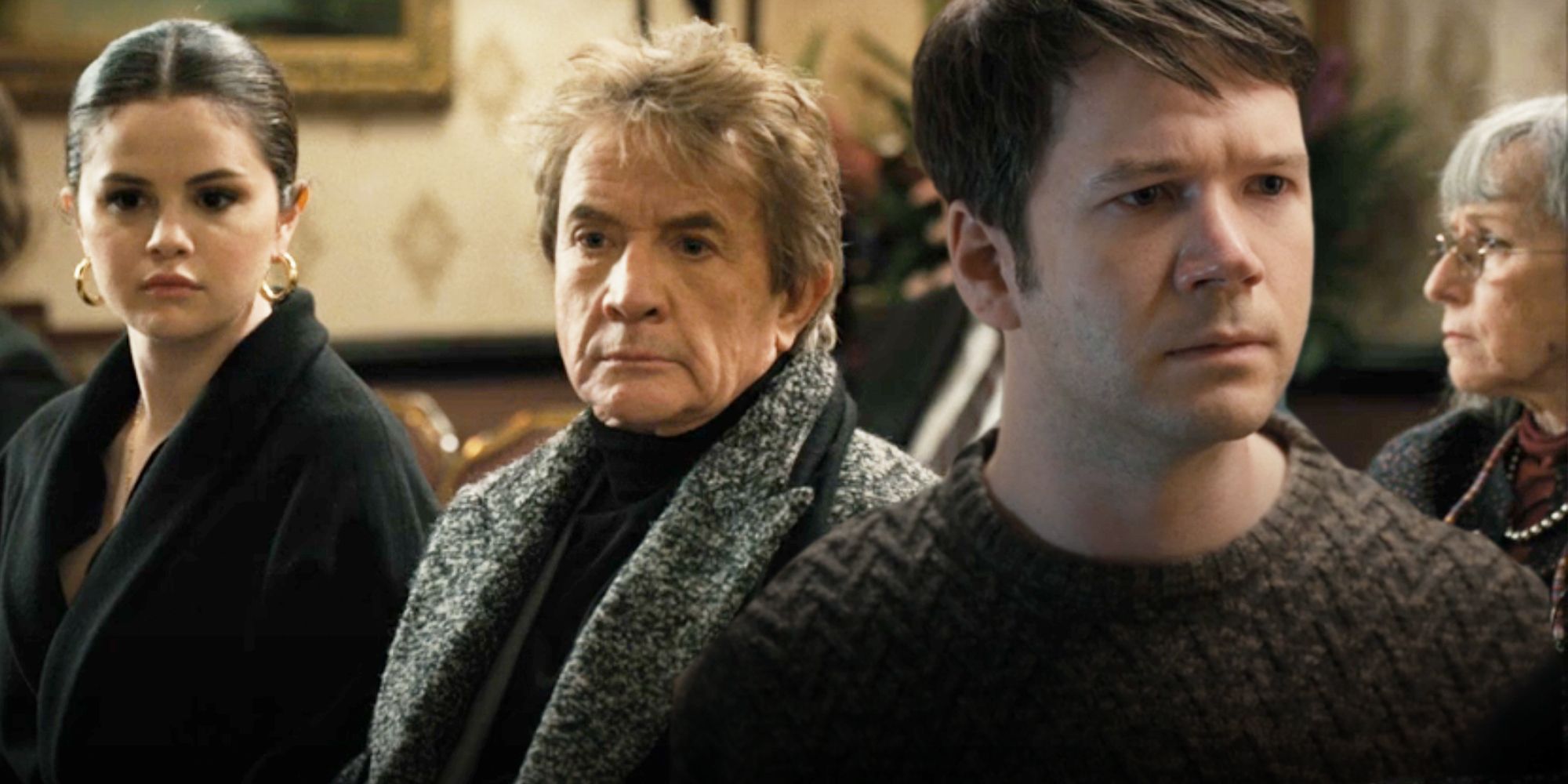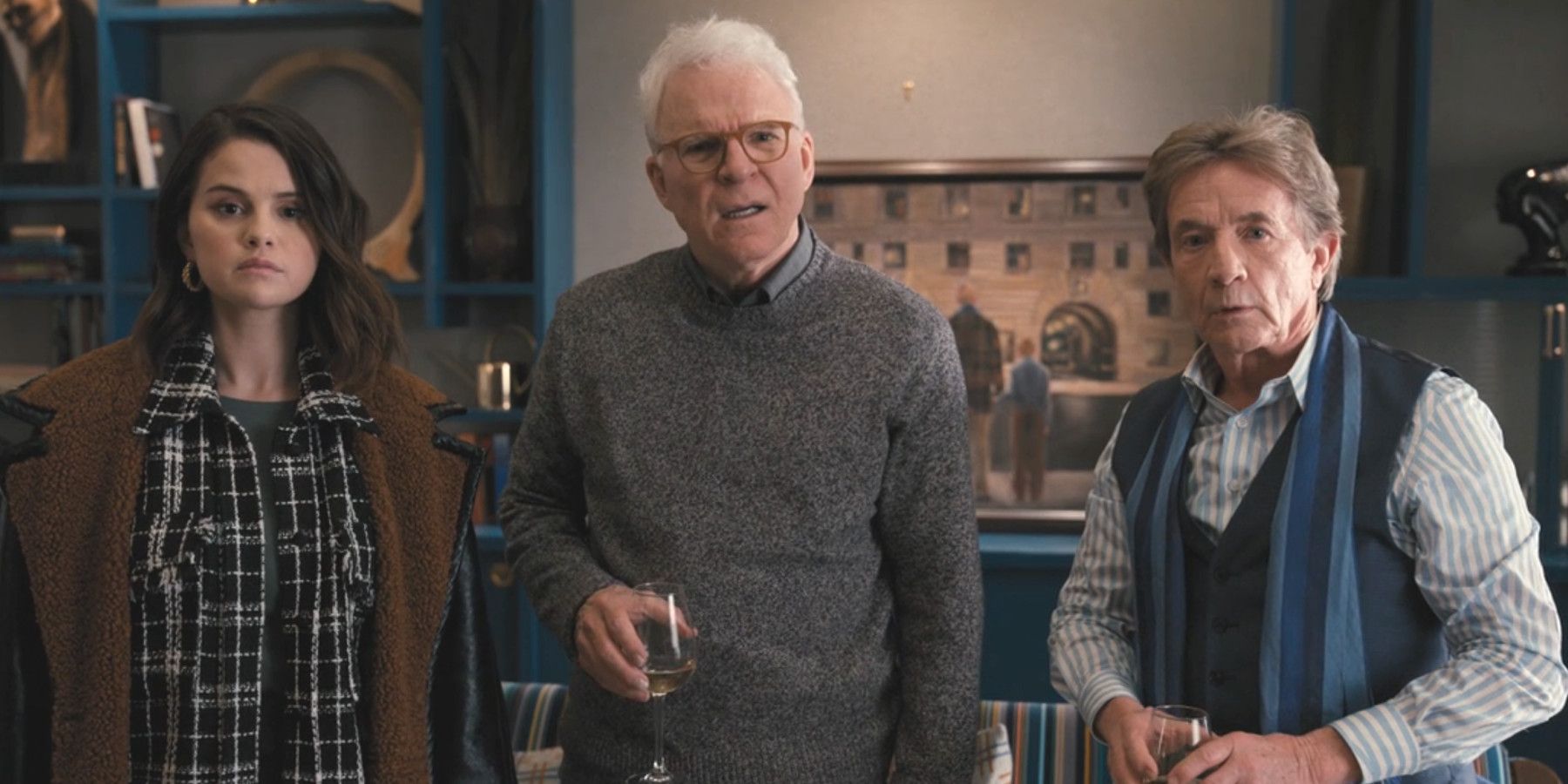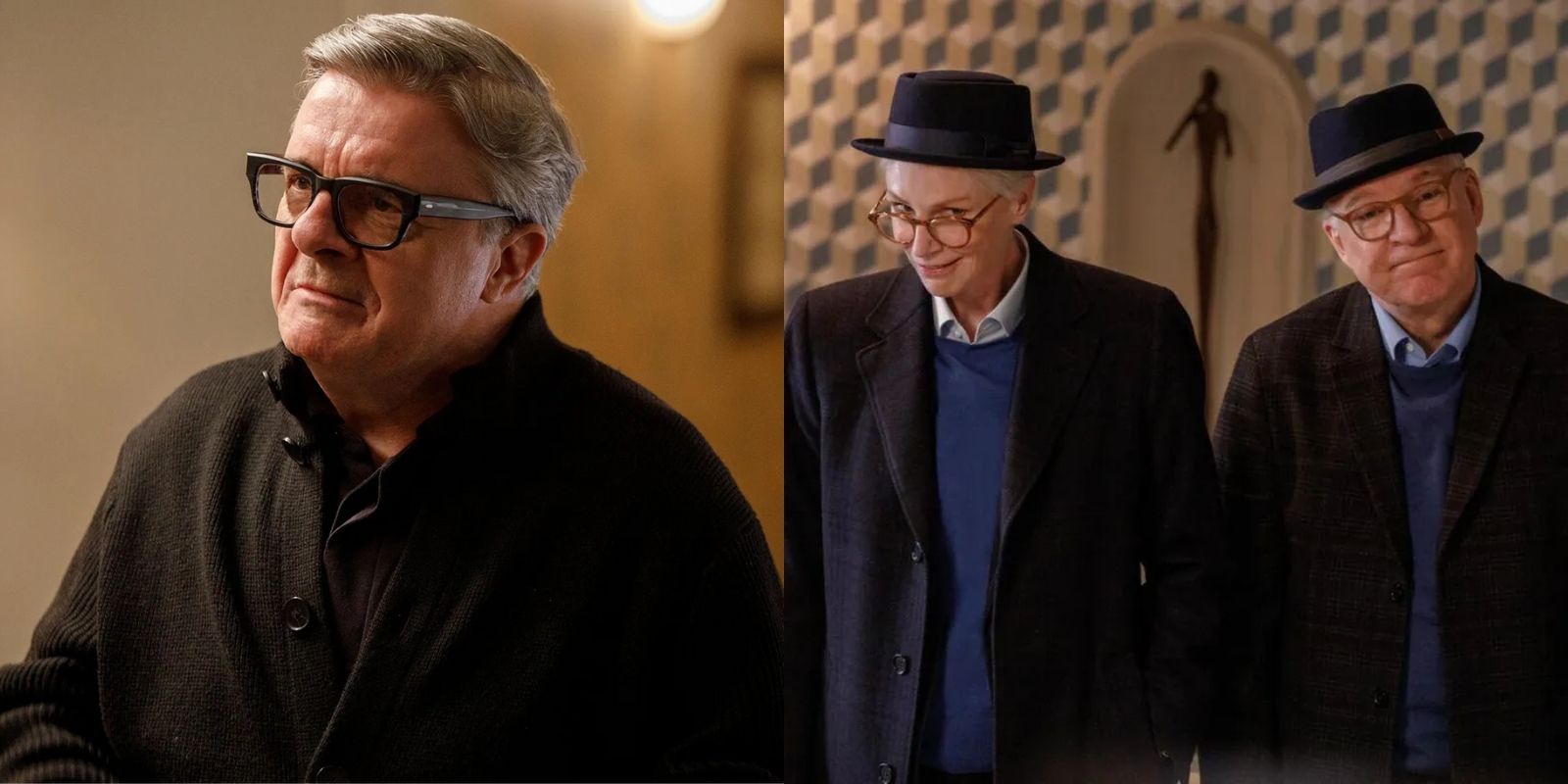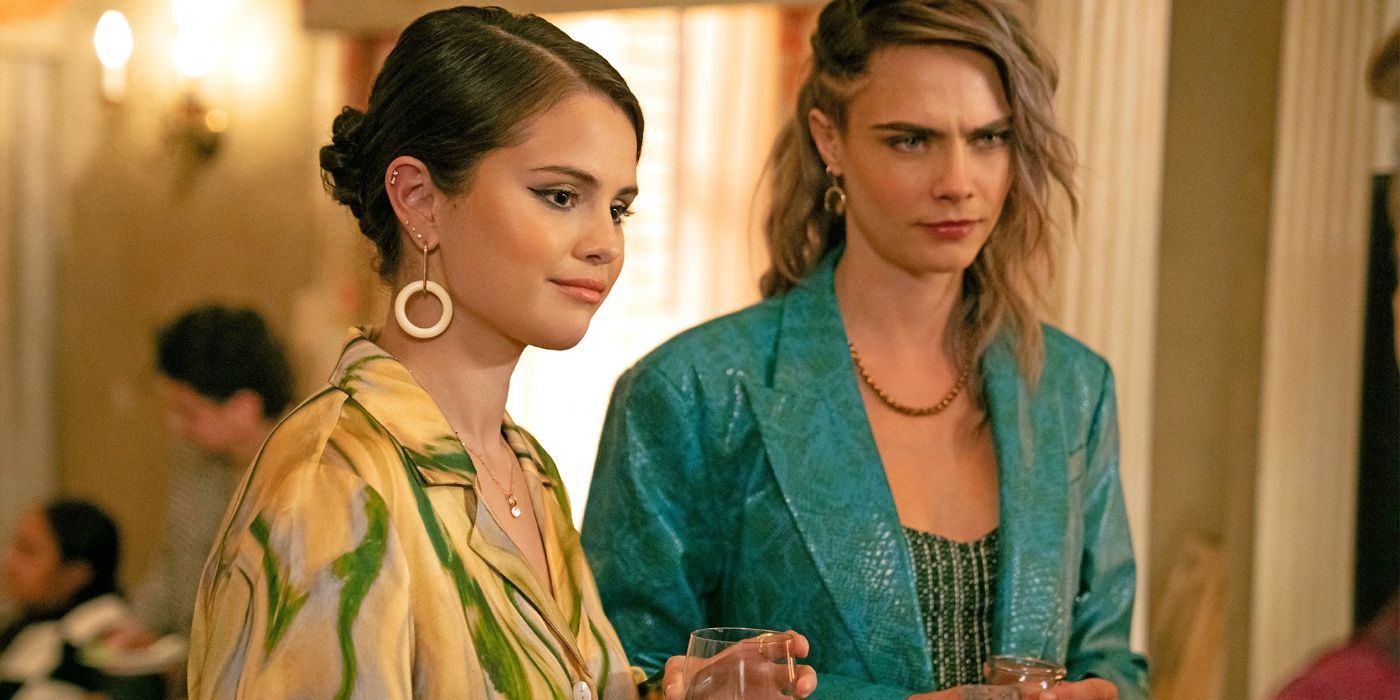Only Murders in the Building season 1 has earned a stunning 17 Emmy nominations, a huge win for the Hulu original series. Stars Steve Martin and Martin Short both earned nominations for acting (Selena Gomez was notably snubbed despite her strong performance), as did guest stars Nathan Lane and Jane Lynch. Two Only Murders in the Building directors are even competing in the "Outstanding Directing for a Comedy Series" category, with Jamie Babbit recognized for her work on an episode titled "True Crime" and Cherien Dabis for "The Boy From 6B".
"The Boy From 6B" is certainly a standout episode of the series, as it is a major creative departure from the rest of the first season. Largely following the story of the deaf Theo Dimas (James Caverly), the episode is almost entirely silent. Much of the story is told through a combination of American Sign Language and subtitles, giving audiences an exciting change of pace toward the end of the season.
Cherien Dabis spoke with Screen Rant about the unique challenges of directing "The Boy from 6B" and working with the show's standout cast.
Screen Rant: First off, congratulations on the Emmy nomination! Is this your first one?
Cherien Dabis: It is!
Wow. Are you the kind of person who, when you were just starting out, used to make up your own acceptance speeches for fun?
Cherien Dabis: You know, it's really funny. I can't say I never thought about those things, but I was never really focused on, "What am I going to say?" And then when I made my first features, I was nominated for three Independent Spirit Awards and a Gotham award, and a Humanitas award. Nothing like the Emmys or the Oscars, but they were a big deal to me at the time as a newbie, little baby filmmaker.
And I remember just being like, "I don't know what to say." I wasn't even that young. I was in my early thirties, but looking back, I'm like "I was a baby!" I had no clue, and I remember being at those awards and praying I wouldn't win. How dumb is that? I just felt so terrified at the idea of getting up there, and now, a little over a decade later, I'm a lot less scared of being in front of people.
You're a writer, actor, and director. Which of those passions kicked off your interest in film and television?
Cherien Dabis: I think I'd have to say writing. It's interesting because in some ways it's just storytelling as a whole, but I guess story begins with writing, really. As a kid, I was so passionate about stories. It started with writing but it also very quickly became writing with the camera, because my parents bought a camcorder and handed it to me because I was the person most likely to learn how to use it. And I did. I read the whole manual front to back, and I started videotaping things my parents wanted me to videotape, like birthdays and whatever - boring things.
And I just started telling people what to do on camera to make it more fun. I started telling them what to do, what to say, where to go, how to walk, and that literally became directing. I had no idea what directing was, and I didn't really find out until ten years later when I finally made it to film school, but in a way, it was all storytelling. It started with, "Oh, let me write this thing, this little scenario, this scene," and then I would pick friends and family members to be in it. And if they didn't do a good enough job I fired them and got in front of the camera myself. So it was literally just me doing everything necessary to tell a story.
That's amazing. This nomination is for Only Murders in the Building, "The Boy From 6B", which is a standout episode of an already great show. How do you even start putting this episode together, and how much work was this? Especially compared to a typical episode of TV.
Cherien Dabis: I would say that definitely more went into it. More went into preparing it, more went into working with the writers and showrunner to make sure that the story never felt gimmicky and that it was always grounded and earned. That the silence, especially on the part of the hearing characters, was always earned. Yeah, there was kind of a lot more thought and research and preparation that went into it. One of the first things I wanted to do was kind of educate myself on ways in which the deaf community had been portrayed and represented in a way that they were happy with, and then ways in which they were misrepresented, and representations that they were unhappy with.
And so I got in touch with the actor playing Theo, James Caverly, very early in the process, which is unusual. And he and I had conversations about all of that. About the ways in which the community wanted to be represented, about the faults of lip-reading which is a very challenging thing to do. A lot more thought had to go into the blocking of the actors, for example, the blocking of characters so that Theo could read their lips. So in some way they're having to face him, but it had to feel organic the way they were moving through the space. So it was a little more meticulously crafted. A little bit more thought out, a little bit more researched, and then of course when we got there, just finding the silence...
It's interesting because the episode is kind of split into two different points of view. Roughly half of the episode is told through the point of view of Theo, the deaf character, and so the silence is understood. We're really seeing the world through his point of view in those scenes. But then the other half of the episode is told through the trio of main characters that we usually see in every episode, and then they're also being silent. And then I found, interesting enough, the bigger challenge for me was really making sure that the silence of the hearing characters felt earned and grounded and that it in no way undermined the silence of Theo. So, it definitely felt like carrying more than your average episode, and making sure that these two perspectives felt very distinct. Not just sonically, which they do, because in one point of view, you hear the world through deaf ears, and in another point of view, you are hearing a lot of ambient sound but no dialogue. How to earn that was a big challenge.
Directing for TV in general seems like it could be really challenging, because you're stepping into something where maybe the tone and the relationships have already been established. What's it like to come in and match what a show is doing while still having your voice as a director?
Cherien Dabis: It's really interesting. It's an interesting balance. You're given the rules of this world, a sort of outline in which to work. This is the way that we operate. But you can find a lot of creative freedom within that, and I think that's really what it is. You have to understand the boundaries of the world in which you're operating, and then sort of figure out, "Okay, what's not been done? What can I bring, that I typically like to do, that maybe we've not seen on this show before?"
I've been really lucky in that - and it's not just luck, I guess I've sought it out - I've looked to take jobs that would give me more autonomy, and more creative freedom. Whether that's been going into season one of a show where things are a little bit more uncertain or in flux, or doing capsule episodes. Like on Ramy, for example, there are a few episodes told from his mother's perspective, and his sister's. And so I think this episode was really like that. I was one of the - I mean, look, the moment I heard who the cast was on this show, I was in. Even before I read anything, I was like, "Sign me up."
But when I first got on the phone with the showrunner and producer and directing producer, and they pitched me this silent episode, I knew it was going to be one of those episodes where I was going to get to put my stamp on it more than your average television episode. And I also knew that given that it's a perspective that we don't get to see very often, that it was something that personally spoke to me and that I would really want to take on.
And you mentioned the cast, who are all so incredibly established. Is there something unique in the way that a set works when everyone is of that level?
Cherien Dabis: I mean, it's pretty incredible actually. I remember there was one day - it was in season two, actually - where I had all of these unbelievable people. It was everyone. It was Michael Rapaport, Tiny Fey, Steve Martin, Martin Short, Selena [Gomez]. Nathan Lane wasn't there, but we should have just put him in there too. It was literally all these amazing - and then Jane Lynch showed up for the next scene, so she was on set that day, and Amy Ryan also. But having all of these people in one scene - it's incredible. So much of the time, you're just letting them do what they do, and maybe just adjusting things ever so slightly. There's just so much laughter on that set. It's pretty awesome.
On Only Murders in the Building, you're directing Steve Martin who is a co-creator, and then you did Ozark where you're directing Jason Bateman, who is also a director. Is there any added pressure, or do you work differently, when you're directing another creator or director?
Cherien Dabis: That's such a good question. It's interesting because when I went into Ozark, I was doing the block right after Jason Bateman. And it was great, because I actually got to be on his set and watch him direct himself, and as someone who has also directed myself as an actor, it was so fascinating and amazing to see what his process is like. So it's a really unique opportunity. In some ways it's a little bit of a master class to see how people at that level work when they're doing multiple things, like Bateman acting and directing or Steve Martin writing and acting. And as someone who does have my hands in all of those, for me I kind of approach each of those opportunities as a master class.
And every time, I really learn something. The first one was Ozark, and I was really nervous the day Jason showed up to act. I was like, "Oh man, he just directed himself, so is this going to be weird suddenly having some other person go 'You know, I think we should do this'?" But he did something so disarming. Basically, when I went up to say hello to him, I was like, "Hey Jason, welcome back," because he had taken a couple of days off after he wrapped his block. He was like, "You know, I am so happy to be here, because this morning I realized that all I have to do is act. I now turn everything over to you." And he did a little bow, and it was so disarming, and amazing, and from that moment on, I was like "I love you." And it was literally as if he had handed me the baton, and I was instantly comfortable. And he was so open.
I think probably when you do a lot of different parts of the craft, when you're not just an actor but an actor and a writer or an actor and a director, I think it does in some ways make you open. Or at least that's the experience I've had. Both with Jason Bateman and with Steve Martin. Like Bateman, Steve Martin is so open, and the great thing about him is that he shows up on set with a million ideas. He'll literally perform them for the entire crew during blocking. He'll be like "I could do it like this, or I could do it like this, or I could do it like this!" And he'll wait to see what makes people laugh, and it's really amazing.
But at the same time, if I say to him, "Well actually, I had another idea, and I thought maybe you could do it like this," he'd go "Oh! Okay, great!" He was never precious about anything, he was never married to any one idea, but instead very, very open and just wanting to find the idea that worked the best. And I just really appreciated that so much. So with every job where there's been someone like that, who is really creating on that level, it's been a masterclass, and I've taken these incredibly valuable lessons.
Thank you so much. And is there something that you're excited to be working on right now?
Cherien Dabis: I'm actually in Boston right now prepping a pilot for AMC called Invitation to a Bonfire. It takes place in the 1930s, so it's period, and it's very, very different from Only Murders in the Building. It's a psychological thriller, but very atmospheric and with a phenomenal cast, so I'm very excited about that one.
Only Murders in the Building Synopsis
Three strangers share an obsession with true crime and suddenly find themselves wrapped up in one.
The Only Muders in the Building season 2 finale drops August 23 on Hulu.




